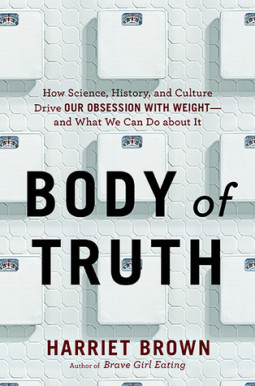This review contains affiliate links, which earn me a small commission when you click and purchase, at no extra cost to you. Thank you for supporting my small business and allowing me to continue providing you a reliable resource for clean book ratings.
The notion that our society is obsessed with weight is probably not a shocking one. But what that entails, what that means for our society as a whole, for individuals, for our relationships with each other, with ourselves, with our doctors … that may be a different story. And Harriet Brown writes in detail in Body of Truth about what she has discovered after a decade digging into research on weight loss, obesity and eating disorders and their relationship with health; interviewing hundreds of women about their feelings about their bodies, and interviewing experts who focus on these topics.
The truth is that Brown’s conclusions have shocked the students taking her body-diversity classes, and they will likely shock most readers and make them rethink much of what they assume, what they think they know about weight and fat. Indeed, most of what doctors and journalists relate and rely on as givens are not based on any solid research, Brown says. These so-called facts include the ideas that obesity will take years off your life (not true; in fact, one repeated and thoroughly vetted, though unpopular, study indicated that “death rates [are higher] for the underweight and severely obese, but not by much); that fat itself causes heart disease, stroke, type 2 diabetes, etc.; and that dieting will make us automatically thinner and healthier.
I defy anyone who’s ever struggled in any fashion with weight, or been concerned with her weight (and Brown indicates this is nearly ALL women), to read this book and not be simultaneously outraged, vindicated, relieved and frustrated. Weight is one of the last ways in which it is OK to be prejudiced; doctors, in particular (read the chapter on the “medical machine” and the many evidences of doctors’ bias against overweight patients and feel your blood pressure rise a bit if you’ve ever experienced it), are not only not helping their patients when it comes to weight issues, but very likely harming them for several reasons.
‘Cause here’s the fact: as Brown writes, dieting is not only not successful for almost everyone in the long run, but it actually changes our metabolism and our brain chemistry. Those who have dieted a number of times over their lifetimes would almost surely be thinner (and let’s say at the minimum less stressed-out) if they had never attempted to diet (feeling angry now?). And the science seems to indicate one real truth that still has not made it into most doctors’ heads and the minds of the culture at large: regular exercise/fitness level is the only behavior that truly makes a difference for health and mortality, no matter the person’s weight. But say “fat and fit” is possible anywhere online or in public (or to your doctor), and just sit back and watch the backlash pour in from any number of sources.
Body of Truth may be just what most of us need, so we can be kinder to ourselves and others and truly take care of the bodies we have by seeking better fitness for health; letting go of complex negative feelings about food; and finally accepting our bodies, individual and different as they are from each other’s. Unfortunately, though reading this and putting these kinds of messages out into the culture will help immeasurably, it will likely be a long while till change actually happens.
Rated: Moderate, for one use of strong language and one use of moderate language.
Click here to purchase your copy of Body of Truth on Amazon.




